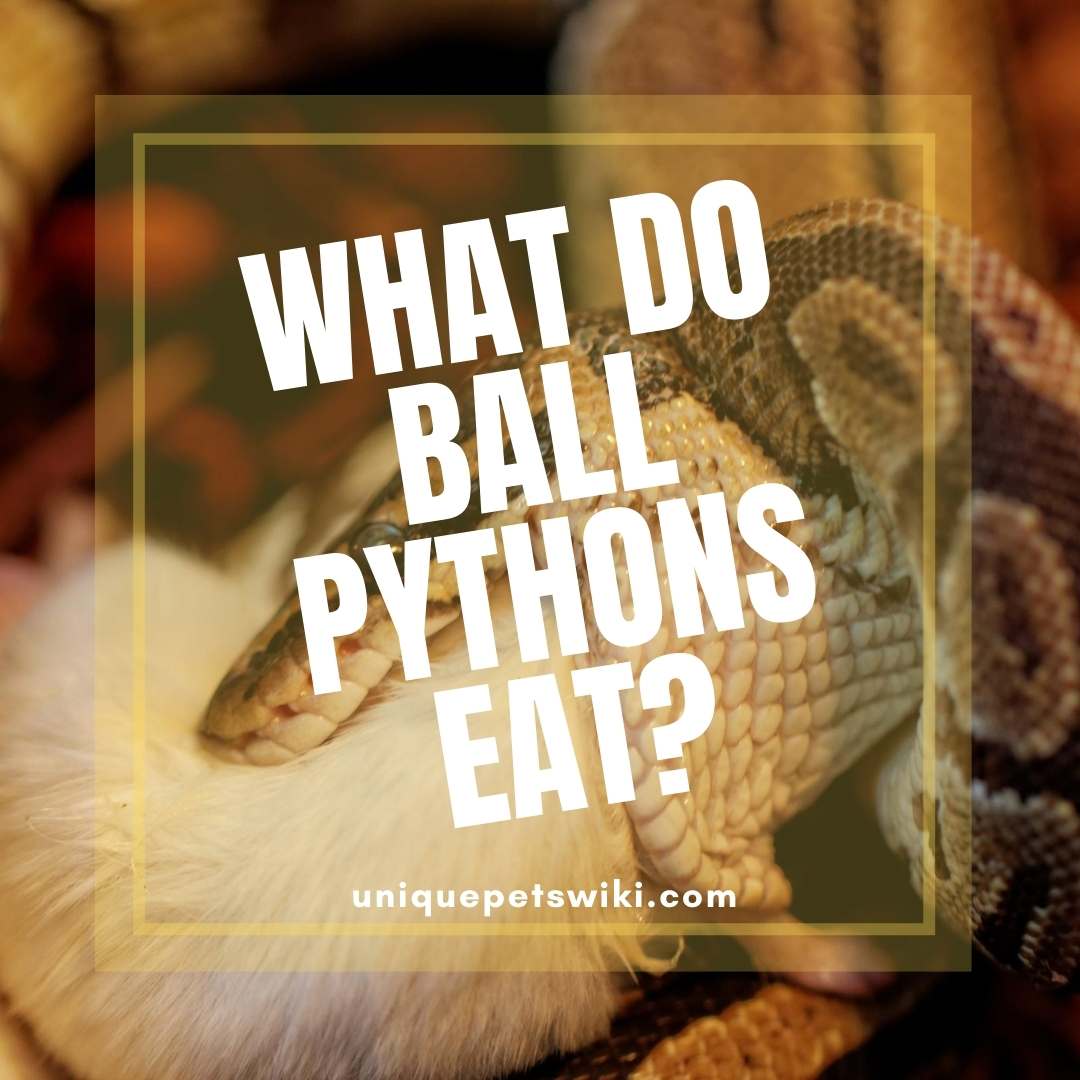Many ball python owners are often bothered with the question of what to feed their pet snakes. Most of the time, this question arises once they are finding it difficult to feed their snakes regularly.
Every animal has its unique requirements to stay healthy in captivity, and that includes a proper diet. While some have a wide variety of food such as skinks, others like ball pythons cannot boast of wide varieties.
Therefore, it is advisable that before getting a pet, you must do a thorough research on the animal. Especially on its housing needs and diet. Ball pythons in the wild often feed on different kinds of rodents, birds, small mammals, and lizards.

While in captivity, they should also be offered a variety of prey to feed on. Giving them a variety of prey to eat in captivity will ensure that they do not grow to be picky eaters.
In the next section of this article, you will know about what ball pythons eat as their main source of food. To learn about other varieties of feeders you can give to your ball pythons apart from their main food source, keep reading the article to the end.
Contents
What do Ball Pythons Eat?
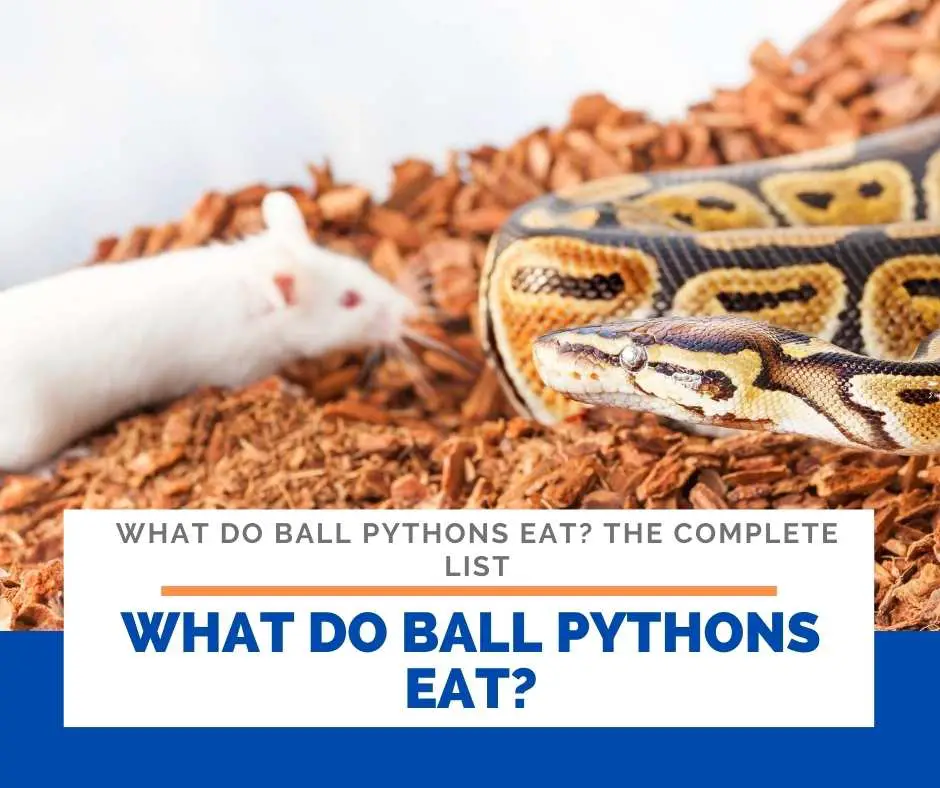
Going by environment or availability of prey, wild ball pythons have varieties of prey to feed on than their captive counterparts. These include birds, rats, striped mice, lizards, mammals, amphibians, jerboas and gerbils.
While those in captivity are often fed only different sizes of rats and mice. The problem is not that captive ball pythons wouldn’t take some of the foods if offered. Some breeders just feel that those foods aren’t safe for them.
In the wild, depending on their gender, they feed on different species of prey. Naturally, the male pythons spend more time in trees than the females. Hence, they feed primarily on birds. While the females concentrate on rodents since they are floor dwellers.
In captivity, the hatchlings and juveniles are usually given fuzzy mice, pinkie mice, hoppers, rat pups, and fluffs. As they grow older and get larger, they are offered adult rats and mice.
One important point to note is that feeding rat pups and fuzzies to your pet ball pythons at the early stage will help them to get along with other types of prey as they grow to adulthood.
With this, the male ball pythons can accept eating small-sized chicks and duckling. Note that the sizes of feeder animals should not be bigger than the midsection of your snake.
Besides, your snakes should always be given full feeder animals (that is a whole prey). Feeding them sparingly would deprive them of the complete nutrients contained in the food.
Do Ball Pythons Eat Anything other Than Mice?
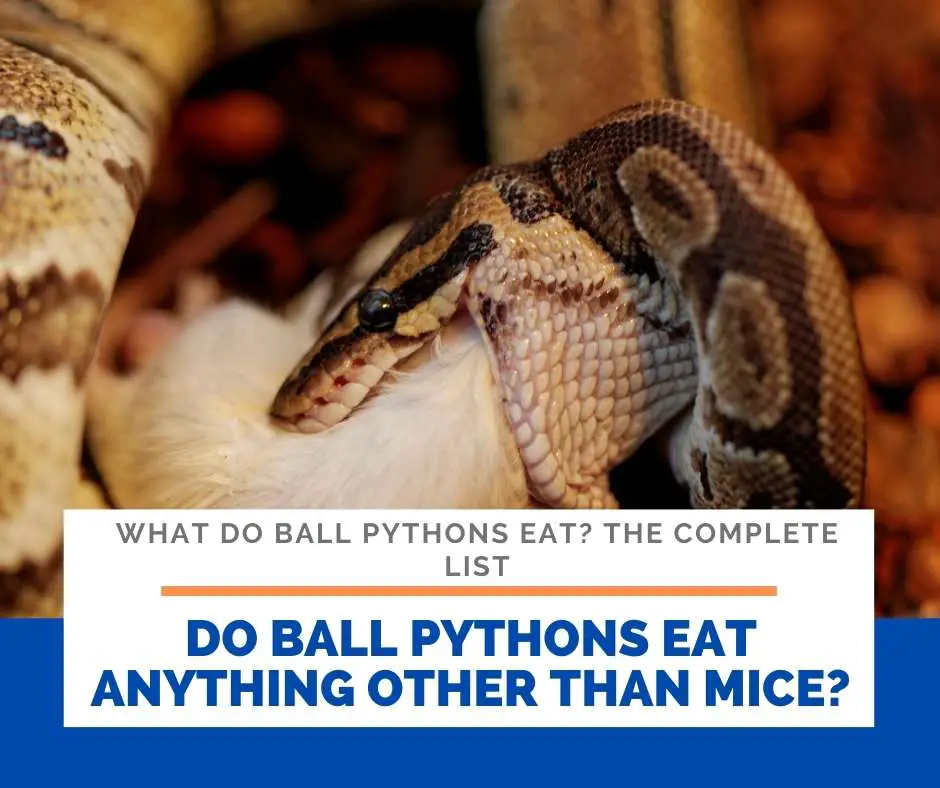
Ball Pythons feed basically on a diet of mice or rats both in the wild and in captivity. But there are many other feeder alternatives you can offer them. As mentioned earlier, baby and juvenile ball pythons should only be fed Pinky and fuzzy mice, or rat pups because of their size.
As they grow into adulthood you can offer them something different from mice and rats. Such feeder alternatives include chicks, squirrel gobbles, hamsters, and ducklings, and even fish.
Do Ball Pythons Eat Fish?
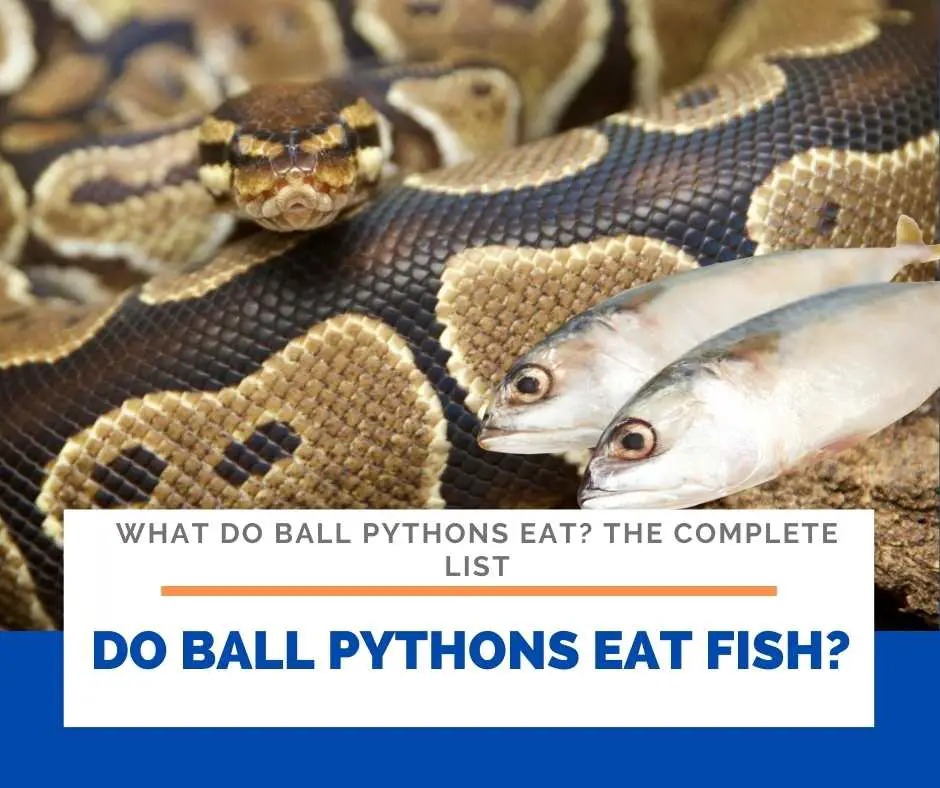
You would agree with me that this species of snake lives on land and do not likely come across water animals in their natural environment. However, the ones that live close to water bodies can feed on small fishes they come across to survive.
For your pet snakes, you can experiment giving them fish. Some breeders have reported of their captive ball pythons feeding well on a diet of fish. But this might not be the case with other snakes.
Since fishes are cold-blooded, the best way to feed them with fish is to warm it above room temperature. There are diverse kinds of fishes. Note that not all fish types are ideal for ball pythons.
Fishes such as mackerel, goldfish, flathead minnows, rosy reds, and whitebait should not be given to them. These fishes contain enzymes that can block the absorption of vitamin B1 (thiamine).
Thus, to feed them with fish that have 0% of thiamine enzyme is encouraged. However, making a diet of fish their main food isn’t advisable. Since they don’t eat it often in the wild, it should only be given to them occasionally.
Do Ball Pythons Eat Frogs?
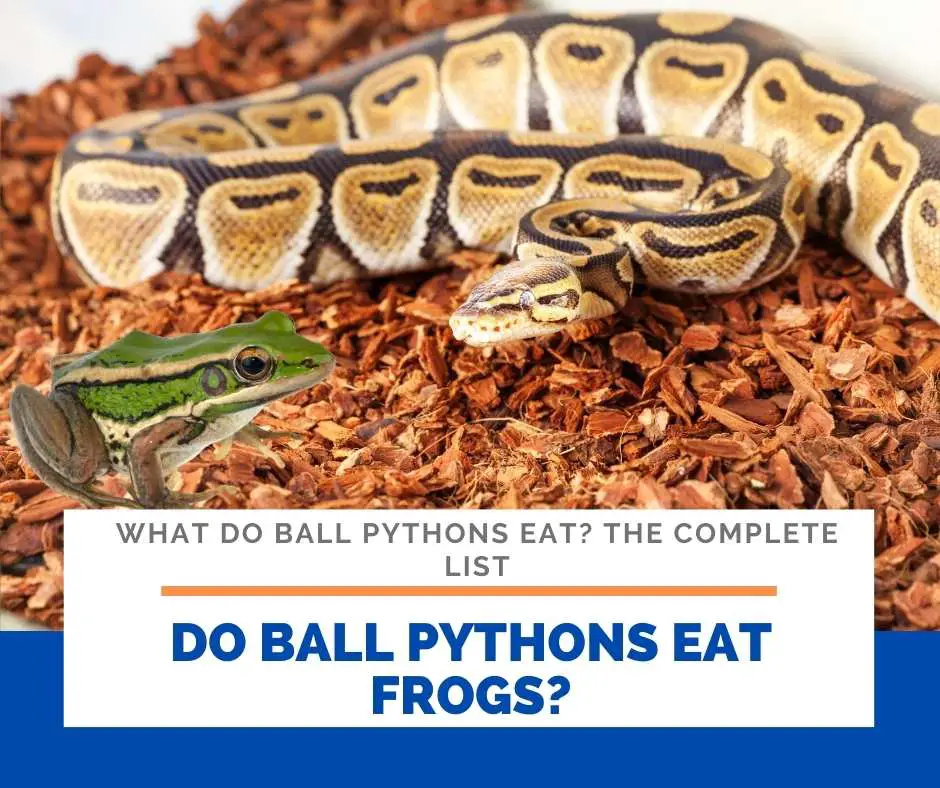
This should be a question of ‘will ball pythons eat frogs?’ They do not eat frogs in the wild and will likely not accept it if you offer them. Except that you tricked them to believe it’s something else.
Since they are cold-blooded, feeding them cold-blooded prey predisposes them to contaminating diseases. And also finding it difficult to digest the food. If you should ever experiment feeding your pythons with frogs, try species such as the American toad or a frog that is of the same size.
Even with this, make sure that the frog is not wild-caught. This will eliminate the risk of your snake contaminating parasites. In addition, you should only try this occasionally.
Do Ball Pythons Eat Crickets?
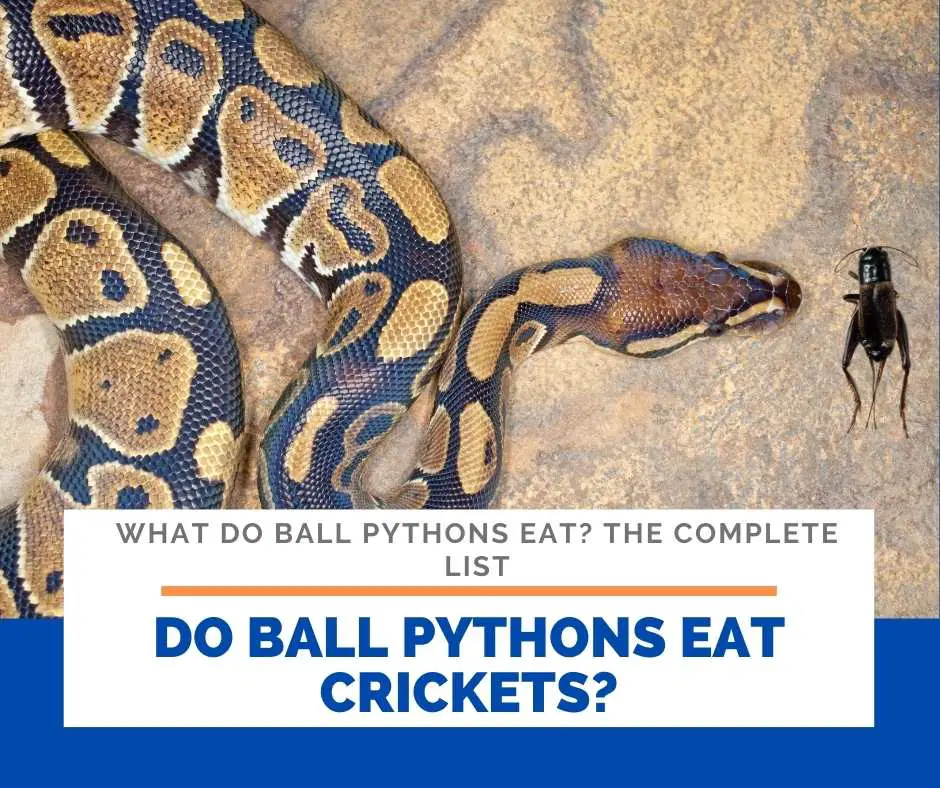
There is this controversy among breeders whether or not to feed crickets to ball pythons. While some believe that offering their pet snakes crickets makes them active, the fact remains that ball pythons feed on rodents and may not accept a diet of crickets.
What some breeders refer to as “my pythons were active on a treat of crickets” might just be that the snake was struggling to get rid of the crickets crawling on it. Crickets haven’t been proven to add any nutritional value to ball pythons. Hence, your pythons can survive without it.
Do Ball Pythons Eat Other Snakes?
Ball pythons aren’t in the class of snakes that prey primarily on other snakes. But that is not to say that they can’t constrict and eat other small snakes of a different species if they come across one.
Although they can adapt to stress more than other species of snakes, they don’t like living in groups. Therefore, housing a baby or juvenile ball python together with an adult of a bigger size is not advisable.
The bigger adult can kill and eat the smaller ones. You can only house them together if you deliberately want to offer the younger snake as prey to the older snake.
Do Ball Pythons Eat Lizards?
Young ball pythons can feed on small lizards. But considering that lizards are cold-blooded, they may not find it appealing.
Can Ball Pythons Eat Anoles?
Of course yes. Your ball pythons would be more than glad to eat anoles since they are way smaller in size. In captivity, when they refuse to eat their normal rodents, anoles are often given to them.
As a matter of fact, a group of breeders who reported their ball pythons to accept anoles share their experience.
Wrapping Up
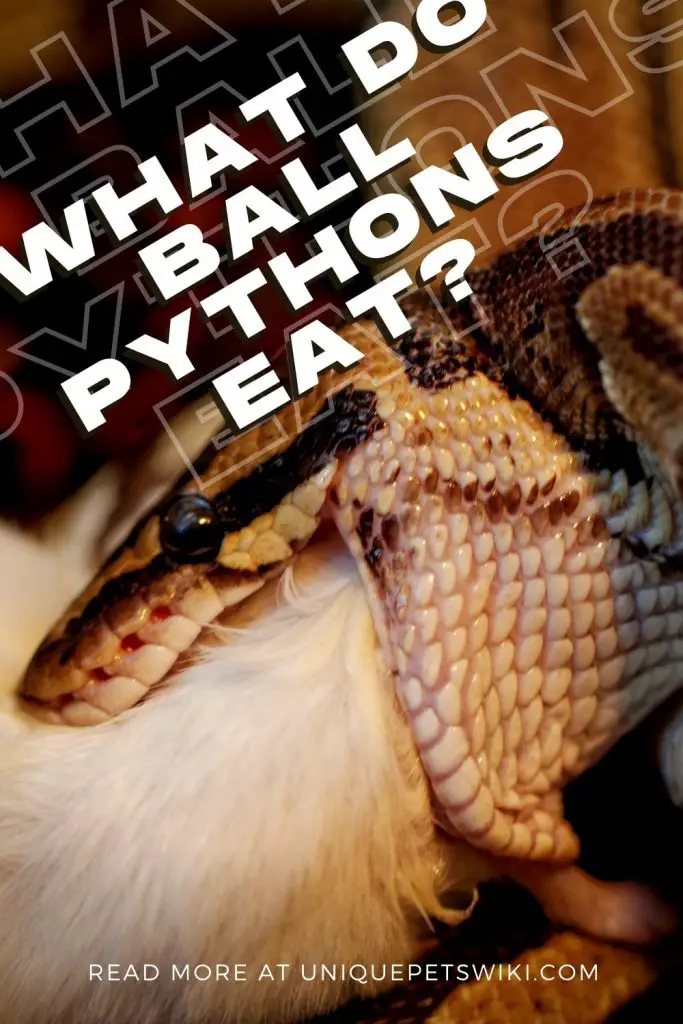
As a ball python owner, we totally understand the stress you would have to go through most times to get your pet snakes to eat. This is why we provide valuable information as this to ease your stress and make you a super good keeper.
You might also be wondering if there are any other kinds of food you can offer to your snakes apart from rodents. However, we hope that having read this article, you should be able to offer a variety of other foods to your snakes.
And ultimately, you should also know how often you should feed them a particular type of prey. We wish you the best with your animals.
Feel free to write to us should you have any questions.
We love feedback.
